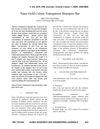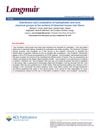 July 2019 in “Iconic Research And Engineering Journals”
July 2019 in “Iconic Research And Engineering Journals” The shampoo bar with Aloe vera and cinnamon oil improved hair health and protected against fungi without causing skin irritation.
 18 citations,
January 2016 in “Elsevier eBooks”
18 citations,
January 2016 in “Elsevier eBooks” Nanotechnology improves cosmetics' effectiveness and safety.
 March 2011 in “European Urology Supplements”
March 2011 in “European Urology Supplements” The document concludes that a new biosensor can efficiently detect prostate cancer cells and that standardized referrals help find significant cancers effectively.
 33 citations,
July 2021 in “Clinical, Cosmetic and Investigational Dermatology”
33 citations,
July 2021 in “Clinical, Cosmetic and Investigational Dermatology” Nanocarrier technology in cosmetics improves ingredient delivery and effectiveness while reducing side effects.
August 2024 in “Journal of Controlled Release” A new treatment using hybrid vesicles with gold nanoparticles and finasteride significantly improves hair regrowth for androgenetic alopecia.
 47 citations,
March 2017 in “Materials Science and Engineering: C”
47 citations,
March 2017 in “Materials Science and Engineering: C” Human amniotic membrane helps heal skin wounds faster and with less scarring.
 24 citations,
September 2018 in “Journal of Materials Science: Materials in Medicine”
24 citations,
September 2018 in “Journal of Materials Science: Materials in Medicine” Hyaluronic acid-based HA2 hydrogel helps heal skin wounds better with less scarring.
 2 citations,
June 2023 in “Gels”
2 citations,
June 2023 in “Gels” Injectable hydrogels are becoming increasingly useful in medicine for drug delivery and tissue repair.
 61 citations,
June 2022 in “Journal of Controlled Release”
61 citations,
June 2022 in “Journal of Controlled Release” Dissolving microneedles show promise for delivering medication through the skin but face challenges like manufacturing complexity and regulatory hurdles.
 April 2011 in “한국생물공학회 학술대회”
April 2011 in “한국생물공학회 학술대회” Lotion with fucoidan from brown seaweed improved skin and reduced allergy symptoms in mice with dermatitis.
 1 citations,
December 2023 in “Egyptian Journal of Veterinary Science”
1 citations,
December 2023 in “Egyptian Journal of Veterinary Science” Astragalus polysaccharides nanogel heals wounds better than Gold-Silver nanocomposite gel.
 58 citations,
November 2013 in “Journal of Innovative Optical Health Sciences”
58 citations,
November 2013 in “Journal of Innovative Optical Health Sciences” Multiphoton microscopy is a promising tool for detailed skin imaging and could improve patient care if its challenges are addressed.
 26 citations,
July 2021 in “Frontiers in Cell and Developmental Biology”
26 citations,
July 2021 in “Frontiers in Cell and Developmental Biology” The review suggests that a special cell-derived treatment shows promise for various skin conditions and hair growth but needs more research for confirmation.
 June 2018 in “Journal of Acupuncture and Meridian Studies”
June 2018 in “Journal of Acupuncture and Meridian Studies” New technologies in acupuncture and biosensors show promise for better medical treatments and healing.
19 citations,
October 2021 in “Nano letters” Gold nanoparticles can safely and effectively treat psoriasis without drugs and have no major side effects.
 43 citations,
February 2020 in “Clinica chimica acta”
43 citations,
February 2020 in “Clinica chimica acta” Nano-sized plant-based chemicals could improve cervical cancer treatment by being more effective and causing fewer side effects than current methods.
 36 citations,
September 2019 in “Journal of Herbal Medicine”
36 citations,
September 2019 in “Journal of Herbal Medicine” Herbal nano-formulations show potential for effective skin delivery but need more research.
 November 2021 in “International journal of life science and pharma research”
November 2021 in “International journal of life science and pharma research” The new gel for psoriasis is effective, stable, and easy to apply.
 July 2024 in “ADMET & DMPK”
July 2024 in “ADMET & DMPK” Surface-modified nanostructured lipid carriers can improve hair growth treatments.
65 citations,
October 2015 in “Acta Biomaterialia” The nano-carrier makes etoposide safer and more effective against lung cancer.
4 citations,
February 2023 in “Frontiers in Oncology” Nano-Pulse Stimulation™ Therapy is more effective and less damaging than cryoablation for treating melanoma tumors in mice.

The new gel with Zinc Oxide nanoparticles and finasteride shows promise for treating hair loss when applied to the skin.
 30 citations,
April 2017 in “Journal of structural biology”
30 citations,
April 2017 in “Journal of structural biology” Human hair keratin fibers have a detailed nano-scale structure that changes with different conditions.
 9 citations,
October 2018 in “Elsevier eBooks”
9 citations,
October 2018 in “Elsevier eBooks” Nanotechnology is improving drug delivery and targeting, with promising applications in cancer treatment, gene therapy, and cosmetics, but challenges remain in ensuring precise delivery and safety.
 36 citations,
October 2014 in “Langmuir”
36 citations,
October 2014 in “Langmuir” Bleaching hair removes its protective top layer and exposes more hydrophilic groups, changing its chemical surface and affecting how it interacts with products.
 January 2020 in “Der Pharmacia Lettre”
January 2020 in “Der Pharmacia Lettre” Nanoparticle-based herbal remedies could be promising for treating hair loss with fewer side effects and lower cost, but more research is needed.
29 citations,
November 2015 in “Acta Biomaterialia” Infrared light can trigger drug release from gold nanoparticle carriers in hair follicles.
 May 2023 in “Materials research foundations”
May 2023 in “Materials research foundations” Nanomaterials like silver and gold can improve wound healing but need more research for safety.
 June 2010 in “Expert Review of Dermatology”
June 2010 in “Expert Review of Dermatology” Scientists found key proteins and genes that affect skin and hair health, and identified potential new treatments for hair loss, skin disorders, and wound healing.
 60 citations,
January 2014 in “Anais Brasileiros De Dermatologia”
60 citations,
January 2014 in “Anais Brasileiros De Dermatologia” Nanotechnology in dermatology shows promise for better drug delivery and treatment effectiveness but requires more safety research.

























